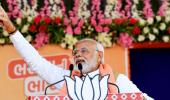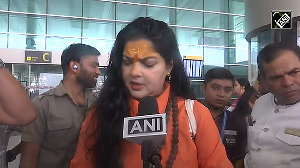'AAP is more acceptable to sections of the middle class because it has pragmatically tried to accommodate Hindu sensibilities.'

Zoya Hasan is Professor Emerita, Jawaharlal Nehru University, and Distinguished Professor, Council for Social Development in New Delhi.
"The Congress hasn't succeeded in putting up an effective argument to counter Hindu nationalism which propelled the BJP to power," Professor Hasan tells Aditi Phadnis/Business Standard.
There is a view that the Aam Aadmi Party will chip away at the Congress base, eventually replacing it. Do you agree with this?
It has already done so in Delhi and to some extent in Punjab. In Gujarat, too, it will cut into the Congress vote share and end up easing the BJP's path to a majority.
AAP has emerged as an alternative to the Congress and is more acceptable to sections of the middle class and media because it has pragmatically tried to accommodate Hindu sensibilities, especially by maintaining a safe distance from minorities and their anxieties.
But for the Congress which is competing with the BJP at the national level, a middle position is hard to sustain, which AAP has managed to do in states, but at the expense of principled politics.
In your judgement, how much of the current slide of the Congress is due to organisational decay? And how much because of ideological fuzziness?
The Congress has been facing an existential crisis since its great defeat in the 2014 elections. The problems it faces can be summed up through three principal verticals: Leadership crisis, organisational corrosion, and ideological ambiguity.
The leadership crisis reflects a deeper crisis of what the party stands for. It hasn't succeeded in putting up an effective argument to counter Hindu nationalism which propelled the Bharatiya Janata Party to power.
It has failed to navigate the divisive politics of the Right which is based on appeals to ethnic identity, stoking historical vendetta, and exploiting group fear and anger.
Ideological ambiguity on key issues, notably, Ayodhya, Kashmir, Citizenship (Amendment) Act, Economically Weaker Section quota, to name just a few, constitutes a major problem in the party's messaging. But the organisational crisis is equally, if not, more serious.
The organisational degeneration was principally due to centralisation and a concentration of power in the hands of top leaders lacking ground-level support.
The crisis grew exponentially due to the party's inattention to the organisational issues during its 10 years in power under the United Progressive Alliance and worsened further in the last eight years in Opposition.
The party has a new head. But not much else has changed. Is an election for the Congress Working Committee and other positions going to deepen the trauma the party is going through? Or serve to resolve and heal?
The election of a non-Gandhi president after 24 years is a breakthrough moment for the party, but this has to be followed by revamp of other decision-making structures, right down to district Congress committees.
These institutions are occupied by leaders who have not won any elections, have no grassroots connection, and are mainly from the Rajya Sabha.
There is no discernible effort to change this. Task Force 2024 for the 2024 Lok Sabha election set up by Mallikarjun Kharge after he took charge is more of the same; it is dominated by leaders who have either never contested or won an election.
Elections to the CWC should be held although it carries the risk of aggravating factionalism and infighting. However, democratisation is essential for the party's revival.
The Congress has to give its state leaders and party units greater autonomy and flexibility. A lot will depend on how deftly the division of work between the Congress president and Rahul Gandhi, the public face of the Congress, is executed to reorganise and revive the party.

Rahul's Bharat Jodo Yatra is as much a way of connecting to people as to revive a moribund party structure. But many are asking: what after the yatra? Can the party, in its current state of organisational weakness, consolidate the gains and the goodwill the yatra has generated?
Bharat Jodo Yatra is an important mass contact programme that has awakened hopes beyond the traditional support base of the Congress. It shows the party has the organisational bandwidth to execute such an ambitious mass outreach.
It is a good way to rebuild political capital and galvanise voters for the 2024 elections. It could eventually revive the Congress by stirring a pushback against divisive politics and the slide into authoritarianism. It's too early to assess its electoral impact.
While the Congress claims that the yatra is not a tool to win elections, its success will only be gauged in electoral terms in the future. The results in Gujarat and Himachal Pradesh elections are bound to affect the yatra's perception in the eyes of an already hostile media that has scarcely covered its huge success in the southern states and Maharashtra.
On caste and religion, the party has suffered from confusion in the past. Has that cleared up?
The contradictory pulls exerted by divergent approaches on caste and community issues are responsible for the impasse plaguing the party.
The Congress functions as a loosely organised party with a loosely defined ideology. With a weakening of its support base, the Congress has swung between making ideological compromises with majoritarianism and plotting a frontal battle against it.
The party has to offer voters an economic and political blueprint to tackle inequities and injustices.












